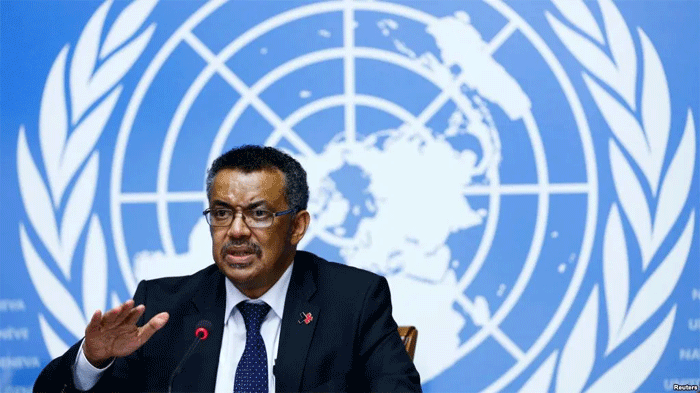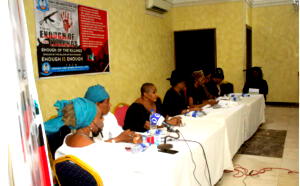WHO’s Director-General, Dr. Tedros Ghebreyesus. The World Health Organisation (WHO) has listed some of its achievements in combating COVI...

The World Health Organisation (WHO) has listed some of its achievements in combating COVID-19 in 2020, noting that vaccination is no guarantee of virus eradication.
WHO’s Director-General, Dr Tedros Ghebreyesus said this at the last COVID-19 press conference of the year at WHO headquarters in Geneva.
In a speech posted on the agency’s website, the director-general said WHO had worked tirelessly since the virus was reported in Wuhan, China in December 2019.
“If we rewind to the start of 2020, it was on 10 January that WHO published its first comprehensive package of guidance documents for countries, covering topics related to the management of an outbreak of a new disease.
“The next day, WHO received the full genetic sequences for the novel coronavirus from China and by 13 January, WHO published its first protocol for a diagnostic test by a WHO partner lab in Germany to detect the virus.
Also read: As US election day approaches, inaccurate claims persist
“By mid-January, our international technical expert networks were engaged and meeting by teleconference to share first-hand knowledge with the new novel coronavirus and similar respiratory viruses, such as MERS and SARS.
“And WHO convened the Strategic Technical Advisory Group for Infectious Hazards and the Global Alert and Response Network.
“By the end of the month, 30 January, I declared a Public Health Emergency of International Concern, WHO’s the highest level of alert under the global health law,’’ he said.
And by the start of February, he said WHO was shipping diagnostic tests around the world so that countries could detect and respond effectively.
“On 4 February, WHO released the first global preparedness and response plan for COVID-19 based on the latest scientific evidence.
“At the same time, WHO was connecting scientists, funders and manufacturers from across the globe together to accelerate research on tests, therapeutics and vaccines.
“In mid-February, WHO’s longstanding research and development blueprint group brought hundreds of experts from more than 40 countries together to plot out a COVID-19 research roadmap.
“This was based on years of work on other infectious diseases including SARS, MERS and Ebola.’’
And by March, the director-general said WHO was planning the Access to COVID-19 Tools Accelerator, which was launched with partners in April.
The director-general said the ACT-Accelerator was a historic collaboration to further hasten the development, production and equitable access to vaccines, diagnostics.
“Good news came in June as initial clinical trial results from the UK showed dexamethasone, a corticosteroid, could be lifesaving for patients severely ill with COVID-19.
“By September, new antigen-based rapid tests had been validated and the diagnostic pillar of the ACT-Accelerator had secured millions of them for low- and middle-income countries.
“And then the shot that rang out around the world was the release of positive vaccine news from multiple candidates, which are now being rolled out to vulnerable groups,’’ he said.
According to him, new ground has been broken not least with the extraordinary cooperation between the private and public sector in this pandemic.
“ In recent weeks, safe and effective vaccine rollout has started in a number of countries which is an incredible scientific achievement.’’
Meanwhile, some senior officials of WHO had warned that vaccination does not guarantee that infectious diseases would be eradicated.
Dr. Mike Ryan, head of the WHO Emergencies Programme warned that there might be a chance of another pandemic, more serious pandemic spreading across the world.
“The next pandemic may be more severe; we need “get our act together” because we live on a fragile planet, and in an increasingly complex society.
“Let’s honour those we’ve lost by getting better at what we do,’’ he said
Also, the WHO Technical Lead on COVID-19, Dr Maria van Kerkhove, noted that some of the countries that had coped better with COVID-19 had a history of managing outbreaks.
“Those countries that have coped better are not necessarily those with the highest incomes, but those that have lived through other infectious disease outbreaks.
“Those countries have used the “muscle memory” of traumatic events to kick their systems into gear, and act to comprehensively tackle the virus,’’ she said.
Kerkhove, however, called for the world to be better prepared for the next health crisis, with well-trained health workers able to take full advantage of innovative technology, and informed, engaged citizens capable of keeping themselves safe.
Also, Guest speaker Prof. David Heymann, a disease expert and member of a WHO “surge team”, said that we now have the tools at our disposal to save lives, allowing us to learn to live with the virus.
Heymann deployed to strengthen the COVID-19 response in South Africa earlier this year said COVID-19 was likely to become endemic in the global population.
Vaccinations, he explained, do not guarantee that infectious diseases will be eradicated.
“Societies would do better to focus on getting back to full strength, rather than on the “moonshot of eradication”, said the official.
The post COVID-19: WHO lists achievements, says vaccination no guarantee of virus eradication appeared first on Vanguard News.

No comments